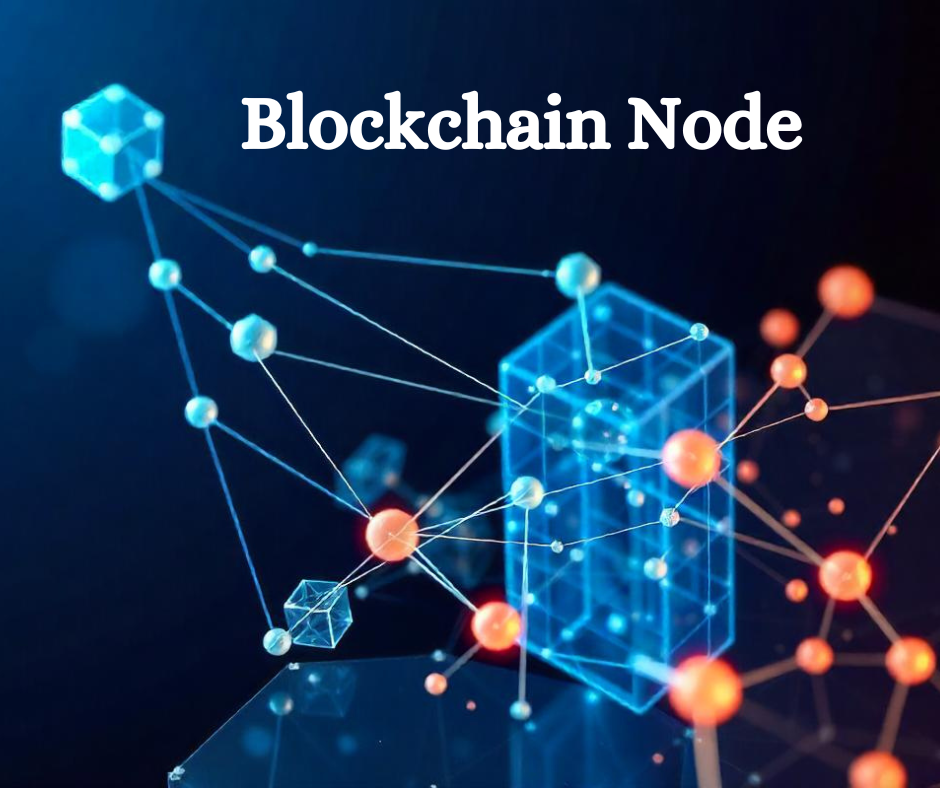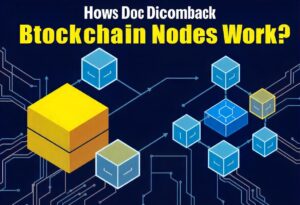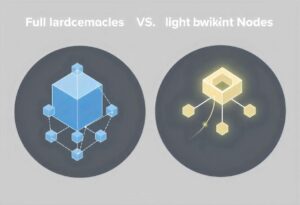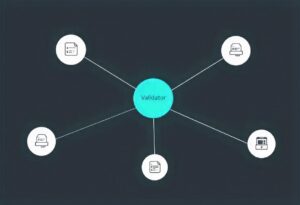What Is a Blockchain Nodes? An In-Depth Exploration
A blockchain node’s decentralization, security, and utility depend on it. But what is a node? First, learn how blockchain nodes function to understand this. Any device with a blockchain copy and network connection is a node. Nodes also check, confirm, and carry transactions.
Three nodes are critical because they manage the blockchain and prevent any individual or group from dominating it. In each transaction, the nodes participate in the verification process, which promotes efficiency and credibility. As a result, anyone wishing to understand blockchain technology must first understand the concept of nodes.
Understanding the Role of Blockchain Nodes Networks:
It is important to track these nodes in the blockchain and learn more about what they do. Everything in the network is linked to everything else so that each node can talk to another. During a transaction, all nodes are aware of it, and they check the transaction every time it happens. This checking process is called consensus and is one of the main reasons blockchains are considered safe.
Every node keeps track of all the events, so it’s easy to make a backup and stop anyone from changing the past. Nodes confirm new transactions and keep the blockchain safe by storing and sending transaction information. So, nodes are a significant part of a blockchain system because, without them, the whole structure of the blockchain would fall apart.
How Do Blockchain Nodes Work? A Beginner’s Guide:
Before we get into what kind of node this term refers to in the blockchain, it might sound strict and hard to understand. However, it’s not that hard to know when it comes to the specifics, especially if you try to get the big picture. Each node serves a specific function that may differ depending on the node type. Generally, a node’s job is to store the blockchain and participate in the network’s work.
Decoding the Technical Processes Behind Blockchain Nodes:
Blockchain nodes know about each other and share data to ensure all of their data is in sync. Blockchain nodes understand each other and share data to ensure they all have the same information. For example, if a transaction takes place, it is sent to all the nodes in a vast network. Then it sends these nodes, and they all check that the above transaction is genuine. Usually, the nodes have to check these kinds of transactions. If most agree, the transaction goes through and is added to the blockchain.
As soon as new events occur, the nodes update the ledger that they have all downloaded. Every node should check the blockchain to ensure that only proper blocks are added. A “consensus” process provides the network doesn’t accept transactions or blocks that aren’t supposed to exist.
Why Nodes Are the Backbone of Blockchain Technology?
The nodes are an essential part of blockchain technology; without them, there would be no blockchain as we know it today. To be precise, the quantity of nodes in the network determines how decentralized the blockchain is. A node in the blockchain makes distributed ledger technology (DLT) function well compared to standard systems, where a central authority controls all data.
The Essential Role of Nodes in Decentralized Networks:
When using blockchain, data exchanges are not subject to review by a centralized server or anyone else. This is because blockchain is decentralized in every way. However, the data is spread across several nodes instead of being gathered in one. This is important because it ensures that network sites stay safe and working even if something goes wrong or there is an attack.
Nodes also don’t allow censorship or control because power is spread out, and no one node can control the others. Each node works independently within the blockchain, but they all work together to keep the system going. The method is very safe because this structure is very good at stopping misuse, fraud, or cyberattacks.
The Different Types of Blockchain Nodes and Their Unique Functions:
Not all nodes in a blockchain network are responsible for the same things. As part of the blockchain design, structural divisions of the nodes are also made, and they are put into the following groups: These types give information about how the blockchain node works in the network.
Full Nodes vs. Light Nodes: What’s the Difference?
A blockchain has two main kinds of nodes: full nodes and light nodes. A “full node” holds all of the blockchain’s information and helps validate. Full nodes must be present for the network to work and check blocks and transactions.
On the other hand, the light nodes only have some information about the blockchain because they are designed to sync with the full nodes occasionally. Full nodes handle the rest of the data, which we will see next. They only store some of it, though. Some people want to join the network but don’t want to run a full node, which takes a lot of resources. Light nodes are better for them. They also use full nodes to check for the necessary data and confirm transactions that go through them.
Validator Nodes: How Do They Support Consensus Mechanisms?
Validator nodes are a type of node in the blockchain that is very important for consensus methods like PoS. These nodes are in charge of checking new blocks and adding them to the blockchain as a whole. While validator nodes are chosen based on the amount of share they hold, scorers are usually chosen based on other factors.
The validator node’s significant job is to prevent fake transactions from being added to the blockchain. There is also a way to reward these nodes for the blocks they can verify. This means the validator nodes are essential for ensuring the blockchain works correctly and attracts people to the network.
How to Set Up a Blockchain Node: A Step-by-Step Guide:
Having a blockchain node can be very rewarding and complex. As was already said, how each blockchain is set up may differ. On the other hand, it is helpful for people who want to learn how to make a router that will join the network. It provides you direct access to the blockchain, and you can make money from it.
Requirements for Running a Full Node in Popular Blockchains:
To set up a full blockchain node, you will need hardware and software. Specific requirements must be met for other blockchains, like Bitcoin and Ethereum. You also need a peripheral device, enough data bandwidth to handle the transfers and the right software.
To set up a node, a user must first download the blockchain client, which links to other nodes. Some blockchains are very big, so finishing could take hours or even days. Still, once your node is set up, it can validate and approve deals in a network.
Practical Tips for Beginners Looking to Host a Blockchain Node:
You will need hardware and software to set up a full blockchain node. Specific requirements must be met for other blockchains, like Bitcoin and Ethereum. You need a peripheral device, enough data bandwidth to handle the transfers and the right software.
You must download the blockchain client and set up a node to store the whole blockchain. This client links to other nodes. The length of time it takes to finish can change based on the size of the blockchain. Still, once your node is set up, it will be and approve network activities.
Why Running a Node in Blockchain Could Be Profitable for You:
One of the benefits of having a node in blockchain that should be talked about more is the chance of getting paid. Even though it won’t make you rich overnight, running a node can generate a steady income. Because of this, most blockchain networks, especially those with PoS or DPoS protocols, pay node owners for their work.
Node Motivations: Earning Potential from Running a Node
People who set up complete or validator nodes on some blockchain networks get paid. For example, in Proof of Stake blockchains, the people who check the transactions and add new blocks to the chain are paid in cryptocurrency for their work. The people who own nodes will find this helpful because it gives them another way to make money.
Also, the more reliable your node is, the more likely it will be chosen to confirm blocks, which means you will make more money. On the other hand, having a node in the blockchain has some problems, such as the high cost of hardware and electricity.
How Blockchain Nodes Can Provide Passive Income?
Running a blockchain node is one way that people can make money. In networks where nodes are paid for their work, running a node can bring in an inactive, steady, but not very high income. However, the amount that can be earned again depends on the blockchain network, the amount of cryptocurrency risked in proof of the stake models, and how well the node works.
FAQs:
A node in the blockchain is what? How does it work? That’s the first question.
When it comes to blockchain, a node is any device that stores a copy of the blockchain and helps ensure that transactions are approved. Checking the transactions is another way to prove that the system is spread out and evil.
Anyone could be a node in a blockchain network.
If someone has the right tools and software, almost anyone can run a node in the blockchain. Storage space and internet speed are also very important for managing a node.
Why would you want to be a node on the blockchain?
Having a node in the blockchain has benefits. It helps make the network safer, gives you full access to the data stored in the blockchain, and, in some cases, you may even get paid for connecting to the network.
When I do business on the blockchain, is it essential to have a full node running?
You don’t need a full node in the blockchain to do business or participate in the process. Some users are OK with light nodes because they use fewer resources but confirm deals like full nodes.
How much does it cost to run a blockchain node?
Depending on the blockchain being used, running a node in a blockchain has different costs. These generally include hardware costs, electricity bills, internet fees, and sometimes maintenance costs.






